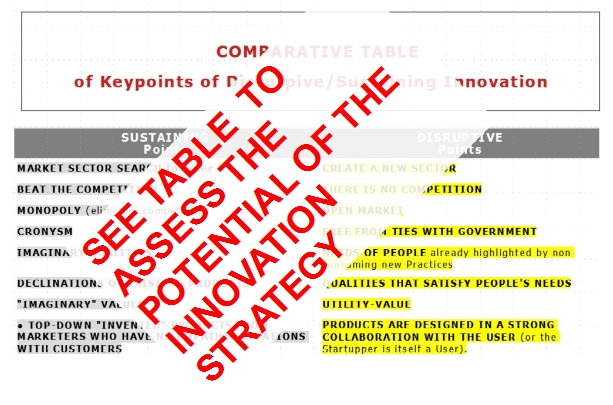The new phase of the market will be based on a Value-oriented innovation characterized by new Business models (from a new Value proposition).
That is,
the products that will be successful
will be those WHICH CAN OFFER
A REAL USEFUL VALUE FOR THE USER.
It is a mega-trend that derives from a reaction of the Customers – who today are forced to spend their little money on really useful products – to the strategies of the dominant market which currently do not produce any useful value for it, but only a “Emotional value” (the current products that dominate the market are not designed to satisfy real needs, but only “imaginary needs”, emotional).
Or today the term Value in the Market no longer refers to the scientific one used for millennia (example: the worth of a house, or the value of the hoe for the farmer).
the problem of “ethical” (ideological) values
But it refers to the ideological “values” (“ethics” of demagogy correctness).
The difference is that the first is a tangible value, that is able to produce actual benefits (measurable according to scientific categories) for the User. While the ethical Values belong to an emotional level, “abstract” (note that in this dimension not only we does not speak of actual benefits, but in it there may be negative consequences for the User who buys a product based on the impulse abstract, not rational).
It should be noted that the ethical Values are characterized by a lack of “objectivity” and universality that characterize the Value defined by the Economy (which has been used for thousands of years in the “market”, or in the context of transactions between individuals – it deals with a value that is solely “economic” in the sense of money, but of value as an effective utility of the product).
That is the ethical Values:
● they are “abstract” because they refer to ideas (the dictates of a dogma), and not to real, objective (measurable) advantages. And moreover
● are related to a specific culture that differs from other cultures (even within a local area); while the benefits produced by the traditional Value of the Market are valid for any human being.
The relativity of the ethical Values appears, for example, when we observe that in the Vegan culture a certain category of products is contemplated as wellbeing whereaspeople from the more “traditional” culture find decidedly them unsatisfactory (and the latter do not necessarily live less healthy life of Vegans). While the universality of the actual (“objective”) Value of a product appears when the members of both cultures perceive a benefit of the objective “scientific” Value of products such as scissors, running water in the home, heating, etc ..
The case of Vegans is just a case of ideological conviction (of “idealism”): it is not that the type of food they consume is not of quality; but their idea that their way of eating guarantees a better level of health than those who eat in a more traditional way (but with knowledge of the cause) is not based on any scientific evidence (laboratory analysis, population statistics).
The ideological (ethical) dimension is not, in fact, universal, whereas the objective value of products is universal: in any culture such products are considered to be a potential benefit (something that can actually improve life).
<see Disruptive innovation: religion, scam or necessity for those who want to stay in the market? >
Obviously some of the ideological issues disclosed by the current Marketing are very important, such as those of the preservation of the Environment.
But the question is that:
● in times of crisis, the product, in order to be sold, must first of all have a value that is actually useful for the User.
● a product purchased for “ethical” reasons, residing these reasons on an “abstract” level, does not convince the potential buyer any more.
As we see in the next paragraphs, products and strategies developed in the name of ethics are not a guarantee of actual ethics: indeed, often the ethical question is used to sell products that are not ethical in reality.
This is possible precisely because working on such an “abstract” plane it is possible to develop demagogic arguments. While in the case of a market based on the actual product values (of which the measurable actual benefits of the product can be directly perceived by the User), this can not happen.
The (false) ethical question of the current market
The fact is that the issues in themselves very important, such as the defense of the environment, today are placed on an ideological level.
The difference between an initiative based on ideological conviction and an initiative based on actual values is that in the first case there is no real awareness of the Citizen about the problem (the problem in this case is not felt because it is not experienced in the first person by User).
While the products that primarily satisfy the real needs (practices) of the Customer, create in the user an awareness of the problem to be solved (even at the “social” level).
An example is the “health” food chain, which offers food that is produced in industrial mode and is distributed in the same way (with all the problems of the case, energy wastage, pollution, complex intermediation that raises the final price, etc …); and produces the same quantities of waste (packs) of ordinary production.
It should be noted that in this case, initiatives such as those of small, zero-kilometer products – if with product certification – offer healthier food, at lower prices, and with less environmental impact (for example for transport). This is the case in which the consumer touches the quality of the system, and develops greater awareness for the social problems related to the food trade.

